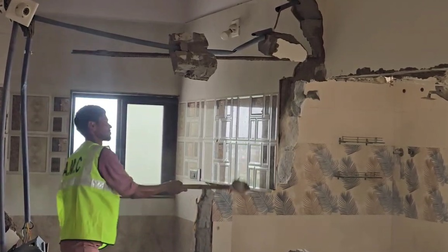

Ahmedabad, July 14 (IANS) In a crackdown, the Ahmedabad Municipal Corporation (AMC) has begun demolition proceedings against an illegally constructed building linked to Salim Jumma Khan, accused in a Rs 100-crore scam involving Waqf Board and municipal land in Jamalpur area of the city.
Salim Khan and four others were arrested on April 20 by the Ahmedabad Police in connection with the fraud.
The Enforcement Directorate also took cognisance of the case in May and initiated its own probe into the matter.
The case dates back to 2009, when Khan allegedly encroached on land that once housed a school destroyed in the 2001 Gujarat earthquake.
Over time, he built residential and commercial units on the site and posed as a trustee, collecting rent from the properties for over two decades.
The AMC had issued a notice during COVID-19 (2019–2020), when the illegal construction took place.
Despite the notice, Khan allegedly sold all 85 flats in the building without legal approval, citing a lack of police protection as a reason for non-compliance.
On Monday, the AMC began demolishing the structure. With bulldozers yet to arrive, workers used sledgehammers to begin tearing down the structure. Power and water supply to the nine-storey illegal building — spread across 2,734 square metres — have also been disconnected. Once the premises are fully vacated, full-scale demolition will proceed.
The Waqf Board in Gujarat is a statutory body responsible for managing and safeguarding properties donated for religious or charitable purposes under Islamic law. Gujarat has thousands of registered waqf properties — ranging from mosques, dargahs, graveyards, and madrasas to commercial and residential assets — many of which are situated in prime urban locations.
However, the board has faced recurring allegations of mismanagement, encroachments, and illegal transfers, often involving powerful local trustees and political interference. Despite periodic audits and state-level oversight, enforcement remains weak, and several waqf lands have been embroiled in disputes or scams — highlighting the urgent need for greater transparency, digitization, and accountability in waqf property administration across the state.
–IANS
janvi/skp
